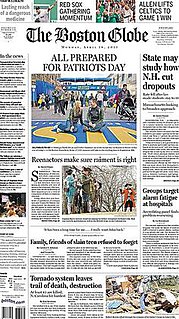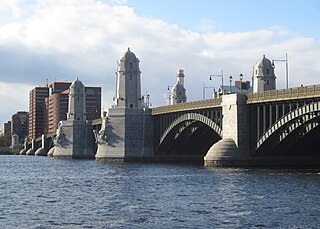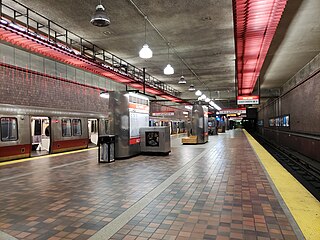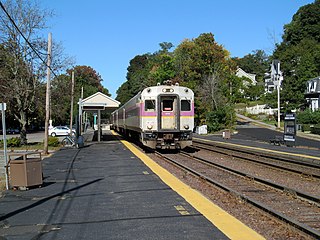Related Research Articles

The Boston Globe is an American daily newspaper founded and based in Boston, Massachusetts. The newspaper has won a total of 27 Pulitzer Prizes, and has a total circulation of close to 300,000 print and digital subscribers. The Boston Globe is the oldest and largest daily newspaper in Boston.

The Longfellow Bridge is a steel rib arch bridge spanning the Charles River to connect Boston's Beacon Hill neighborhood with the Kendall Square area of Cambridge, Massachusetts. The bridge carries Massachusetts Route 3, US Route 3, the MBTA Red Line, bicycle, and pedestrian traffic. The structure was originally known as the Cambridge Bridge, and a predecessor structure was known as the West Boston Bridge; Boston also continued to use "West Boston Bridge" officially for the new bridge. The bridge is also known to locals as the "Salt-and-Pepper Bridge" due to the shape of its central towers.

Alewife station is a Massachusetts Bay Transportation Authority (MBTA) intermodal transit station in the North Cambridge neighborhood of Cambridge, Massachusetts. It is the northwest terminal of the rapid transit Red Line and a hub for several MBTA bus routes. The station is at the confluence of the Minuteman Bikeway, Alewife Linear Park, Fitchburg Cutoff Path, and Alewife Greenway off Alewife Brook Parkway adjacent to Massachusetts Route 2, with a five-story parking garage for park and ride use. The station has three bike cages. Alewife station is named after nearby Alewife Brook Parkway and Alewife Brook, themselves named after the alewife fish.

Davis station is an underground Massachusetts Bay Transportation Authority (MBTA) Red Line rapid transit station located at Davis Square in Somerville, Massachusetts. The accessible station has a single island platform for the Red Line, as well as a dedicated busway on the surface. It opened in 1984 as part of the Red Line Northwest Extension project.

The Haverhill Line is a branch of the MBTA Commuter Rail system, running north from downtown Boston, Massachusetts through the cities and towns of Malden, Melrose, Wakefield, Reading, Wilmington, Andover, North Andover, Lawrence, and Haverhill.

Andover station is an MBTA Commuter Rail station in Andover, Massachusetts. It serves the Haverhill Line. The station has one platform with a mini-high platform for handicapped accessibility serving one track, while the second track lacks a platform. The previous station building, used from 1907 to 1959, is still extant; it was added to the National Register of Historic Places in 1982 as Third Railroad Station.

Ballardvale station is an MBTA Commuter Rail station on the Haverhill Line, located in the Ballardvale village of Andover, Massachusetts.
Kaveh Lotfollah Afrasiabi is an Iranian-American political scientist and author. In January 2021, Afrasiabi was arrested by the FBI on charges of working as an unregistered agent of the Iranian government.

John Nelson Cole was an American politician who served as the Speaker of the Massachusetts House of Representatives from 1906 to 1908.
The 1894 Harvard Crimson football team represented Harvard University as an independent during the 1894 college football season. The team finished with an 11–2 record under first-year head coach William A. Brooks. The team won its first 11 games by a combined total of 326 to 16, but lost the final two games to Yale (4–12) and Penn (4–18).
The 1894 Boston College football team was an American football team that represented Boston College as an independent during the 1894 college football season. Led by William Nagle in his first and only season as head coach, Boston College compiled a record of 1–6.
The 1889 Dartmouth football team represented Dartmouth College as a member of the Eastern Intercollegiate Football Association (EIFA) during the 1889 college football season. Dartmouth compiled an overall record of 7–1 with a mark of 4–0 in EIFA play, winning the league title.
The 1890 Dartmouth football team represented Dartmouth College as a member of the Eastern Intercollegiate Football Association (EIFA) during the 1890 college football season. Dartmouth compiled an overall record of 4–4 with a mark of 1–2 in EIFA play. Charles O. Gill, capatain of the 1889 Yale Bulldogs football team spent two weeks coaching the team in September 1890. Frank Lakeman was the team's captain.

David Scondras was a member of the Boston City Council, having held the District 8 seat from 1984 through 1993. He was one of a few members of the Democratic Socialists of America to be elected to public office.
The 1893 Brown Bears football team represented Brown University as an independent in the 1893 college football season. Led by William Odlin in his first and only season as head coach, Brown compiled a record of 6–3.
The 1894 Brown Bears football team represented Brown University as an independent in the 1894 college football season. Led by William G. Norton in his first and only season as head coach, Brown compiled a record of 10–5.
The 1897 Brown Bears football team represented Brown University during the 1897 college football season. Led by Wallace Moyle in his third and final season as head coach, Brown compiled a record of 7–4. The team's captain was Dave Fultz.
The 1898 Holy Cross football team was an American football team that represented the College of the Holy Cross as an independent in the 1898 college football season.
The 1900 Holy Cross football team was an American football team that represented the College of the Holy Cross as an independent in the 1900 college football season.
The 1905 Springfield Training School football team was an American football team that represented the International Young Men's Christian Association Training School—now known as Springfield College–as an independent during the 1905 college football season. Led by second-year head coach Charles E. Street, the team compiled a record of 3–5.
References
- ↑ Wisslow, Thomas (28 June 1985). "Candidates Clamor for City Council Seats". The Harvard Crimson . Retrieved 2022-09-01.
- ↑ Brodsky, Arthur (1975-11-14). "N. Adams council seeks consensus on city's role in downtown garage". The Berkshire Eagle . Pittsfield, Massachusetts. p. 21. Retrieved 2022-09-01– via Newspapers.com.
- ↑ Juda, Daniel (1970-08-23). "3-way senatorial race stimulates little interest among voters of new Second Middlesex District". The Boston Globe. Boston, Massachusetts. p. 65. Retrieved 2022-09-01– via Newspapers.com.
- ↑ Stewart, Richard (1981-11-10). "Tomorrow's subject on US campuses: nuclear war danger". The Boston Globe. Boston, Massachusetts. p. 39. Retrieved 2022-09-01– via Newspapers.com.
- ↑ Larschan, Brad, "Cambridge nuclear pamphlet a hit", United Press International. October 12, 1981
- ↑ Wylie, David (9 August 2010). "Guest commentary: Atomic bomb anniversary — time to reflect ahead not back". Cambridge Chronicle . Archived from the original on 9 November 2012.
- ↑ "Former Cambridge city councilor Wylie to discuss new book". Wickedlocal.com . 2 April 2010. Retrieved 2022-09-01.
- ↑ Cantrell, Cindy (2010-08-22). "Make Peace, Not War". The Boston Globe . Boston, Massachusetts. p. P5. Retrieved 2022-09-01– via Newspapers.com.
- ↑ "Winter events at Andover Bookstore". The Andover Townsman. 13 January 2011. Retrieved 2022-09-01.